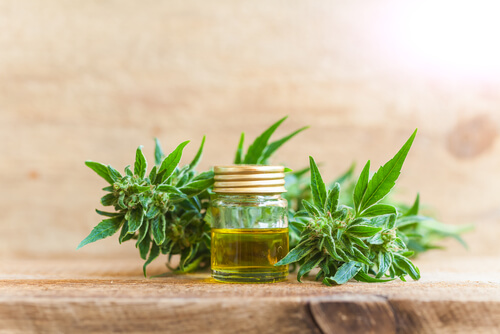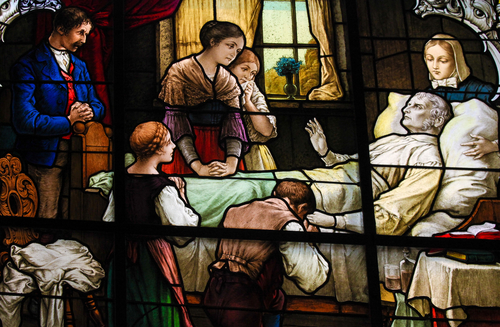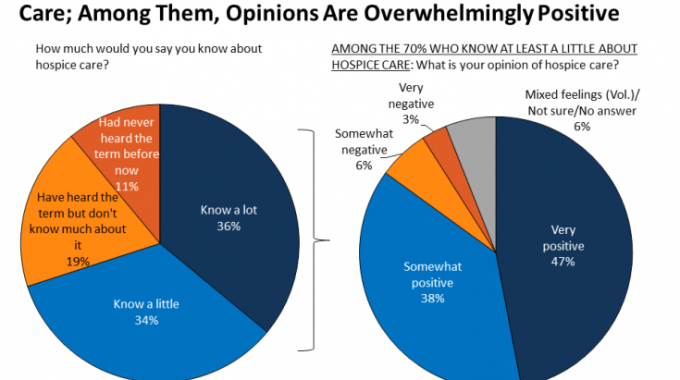
CBD, a Cannabis Extract, May Help Patients Relieve Stress and Anxiety.
As we age, we face a full breadth of health problems that can lead to feelings of hopelessness and angst. Especially in end-of-life care, depression and anxiety are a common problem and are often missed or overlooked. Recent research on cannabis — in particular, the chemical called CBD — has been studied for its medicinal effects to assess its utility in the treatment of stress and anxiety. So far, the scientific results look promising.
What is CBD?
Cannabidiol, better known as CBD, is an extract of cannabis. The cannabis industry has touted it as a compound that can relieve stress and anxiety, as well as relieve joint pain. CBD has become a preferred compound among those who want to explore the medicinal properties of cannabis without the mind-altering effects of the plant (the compound responsible for the ‘high’ is THC, the psychoactive component of marijuana).
How does CBD help with stress and anxiety?
Currently, there exists no scientific evidence through human trials to prove the effectiveness of CBD in regards to the claims made about its medicinal properties. “I think there’s good evidence to suggest that CBD could be an effective treatment of anxiety and addiction,” explained Dr. Esther Blessing, a psychiatrist, and researcher at New York University, to NPR News. “But we need clinical trials to find out.”
What evidence does exist? Animal trials involving mice have shown that CBD does have a stress-reducing effect. However, animal trials hardly present conclusive evidence for the same results in humans. Despite this fact, the cannabis industry has powered forward with their claims that their CBD products can and will help those who suffer from anxiety.
A recent study conducted in Washington State purports that CBD does, in fact, help relieve stress and anxiety. The study surveyed thousands of medicinal marijuana users about their experience with certain kinds of cannabis. “Existing research on the effects of cannabis on depression, anxiety and stress are very rare and have almost exclusively been done with orally administered THC pills in a laboratory,” said Carrie Cuttler, clinical assistant professor of psychology at WSU and lead author of the study. “What is unique about our study is that we looked at actual inhaled cannabis by medical marijuana patients who were using it in the comfort of their own homes as opposed to a laboratory.”
The WSU research team found that cannabis high in CBD and low in THC reduced symptoms of depression, symptoms of anxiety, reduced stress.
There are, of course, problems with the study. First, it has not been replicated or thoroughly peer-reviewed. Second, it surveyed patients who already use cannabis products and believe in its medicinal properties, and responses relied on self-reporting, which is not typically considered reliable data because humans are notoriously bad at self-reporting.
Can CBD help hospice patients reduce stress and anxiety?
Hospice patients face an especially difficult challenge. Common among those in hospice care are signs of anxiety, stress, and depression. Many types of therapies have been employed over the years to ease patient angst, including aromatherapy and essential oils. Other palliative treatments that include prescription medicines can help, particularly if a patient in pain. With all the purported benefits of CBD, could hospice patients benefit from its use? The answer is a mixed bag.
According to science, the effects of cannabinoids on stress and anxiety are proven and measured in animal trials, but no human trials exist to support its use in human populations. Nevertheless, those who have used CBD have reported reductions in stress and anxiety, and the cannabis industry is confident in the effects their CBD products have for medicinal purposes. It all boils down to personal choice. CBD does not have mind-altering effects and therefore does not act like a drug. However, patients who are morally opposed to the use of cannabis, in general, may elect not to use cannabinoids.
Hospice patients who believe CBD will help relieve their stress and anxiety can try to use the compound. If it helps, so much the better. However, what hospice patients need to understand is that as far as science is concerned, there is still too little information available to make a recommendation one way or the other. CBD use, therefore, is an entirely personal decision.
Challenges to the use of CBD
First, hospice patients in states where cannabis is illegal will not have access to CBD. In states where CBD products are available, it is essential to consider the sourcing of the product. Medicinal marijuana shops are the most secure and reliable because they must adhere to strict state guidelines for supply. Recreational shops, on the other hand, can source their products from a broader range of growing operations, and so the potency of their products will vary more widely.
It is important not to forget the existing stigma surrounding cannabis products. As far as the federal government is concerned, cannabis is still a schedule 1 drug, meaning it is illegal in all states, including those that have legalized it. While this will not carry legal implications for most cannabis users, hospice facilities will not offer or consider the use of the CBD or other cannabis products because they are almost all federally certified through Medicare.
What are your thoughts on CBD?
The use of cannabinoids is a personal decision and a try-at-your-own-risk type of product. While there exists good evidence that CBD can help alleviate stress and anxiety, the evidence to date only includes animal trials and anecdotal testimony. For use in hospice, CBD stands to become a powerful tool in the future. However, current restrictions on marijuana restrict the ability of hospices to recommend or administer such products. Until cannabis laws change at the federal level, cannabinoid products can only be used by patients who choose to use them by their own volition.
What do you think about CBD? Would it be a useful tool for hospices and palliative doctors? Leave us a comment below with your thoughts.





